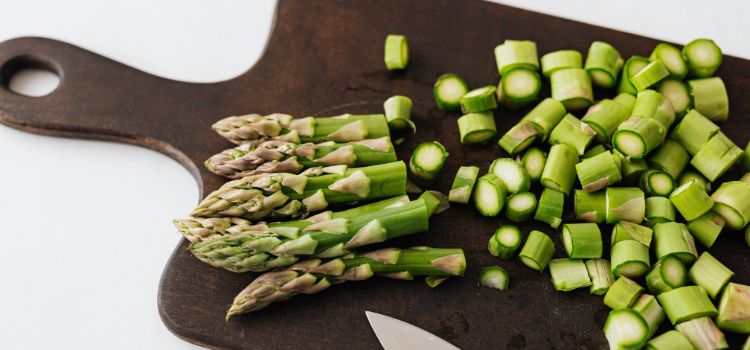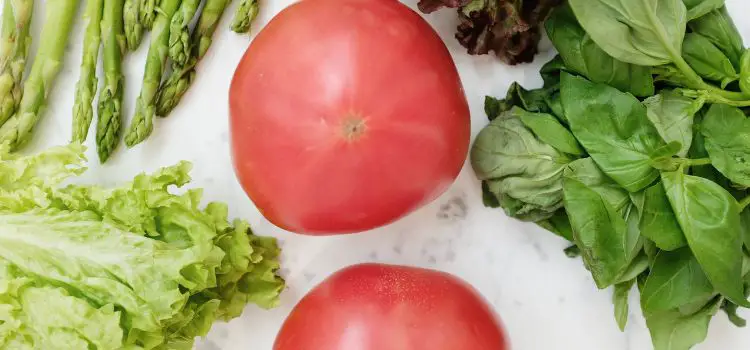Yes, it is safe to eat asparagus while breastfeeding. Asparagus is a highly nutritious vegetable that breastfeeding mothers can enjoy without any concerns.

It is loaded with vitamins, minerals, and dietary fibers, making it beneficial for both the mother and the baby. Asparagus is also easy to cook, making it a convenient and healthy addition to a breastfeeding diet.
The Benefits Of Eating Asparagus While Breastfeeding

Enjoy the benefits of eating asparagus while breastfeeding, as it is loaded with vitamins, minerals, and dietary fibers that are highly beneficial for nursing moms. Asparagus is easy to cook and can be a nutritious addition to your postpartum diet.
Eating a variety of nutritious foods is crucial for breastfeeding mothers, as it provides the necessary nourishment for both you and your baby. One such vegetable that offers numerous benefits is asparagus.
Not only is asparagus delicious and easy to prepare, but it also contains a wide range of vitamins, minerals, and dietary fiber that can greatly support your breastfeeding journey.
Let’s explore the specific benefits of including asparagus in your diet while breastfeeding.
Nutritional Value Of Asparagus
Asparagus is low in calories, making it an excellent choice for mothers who are looking to maintain a healthy weight while breastfeeding. It is a rich source of vitamins A, C, E, and K, which are essential for your overall health.
Asparagus is packed with folate, a vital nutrient that helps prevent birth defects and supports the healthy development of your baby. This vegetable also contains potassium and manganese, which are important for maintaining proper bodily functions.
Vitamins And Minerals In Asparagus
- Vitamin A: Supports healthy vision and enhances your immune system.
- Vitamin C: Boosts your immune system, aids in wound healing, and improves iron absorption.
- Vitamin E: Acts as an antioxidant, protecting your cells from damage.
- Vitamin K: Assists in blood clotting and bone health.
- Folate: Essential for fetal development and the prevention of neural tube defects.
- Potassium: Regulates blood pressure and promotes proper heart functioning.
- Manganese: Supports metabolism and bone health.
Dietary Fiber In Asparagus
- Asparagus is a great source of dietary fiber, which plays a vital role in digestion and maintaining a healthy weight.
- Fiber helps regulate your bowel movements and prevents constipation, a common issue many breastfeeding mothers face.
- It also promotes feelings of fullness, which can be helpful if you are trying to lose pregnancy weight.
Including asparagus in your breastfeeding diet can provide you with an array of essential vitamins, minerals, and dietary fiber, benefiting both you and your baby. So, feel free to enjoy this nutritious vegetable as part of your balanced meals, ensuring that you are fueling your body with the right nutrients during this special time in your life.
The Risks Of Eating Asparagus While Breastfeeding

Asparagus is safe to eat while breastfeeding, but it can potentially give a bad taste to breast milk due to its intense flavor. If your baby refuses to drink asparagus-tinged breast milk, it’s best to avoid it to prevent any digestive discomfort.
Asparagus is a nutritious vegetable that offers various health benefits, but it is important to understand the potential risks it may pose when consumed while breastfeeding. Here are some potential risks to consider:
Allergic Reactions In Babies
Asparagus belongs to the lily family, which can cause allergic reactions in some individuals. If you or your partner have a family history of allergies, it is important to be cautious when introducing asparagus into your diet while breastfeeding.
Allergens from asparagus can be transmitted through breast milk, potentially causing an allergic reaction in your baby.
Potential Gas And Bloating
Asparagus contains a compound called asparagusic acid, which can contribute to gas and bloating. If you or your baby are prone to digestive issues or have a sensitive stomach, consuming asparagus may exacerbate these symptoms. Excessive gas in your baby can lead to discomfort and irritability.
Impact On Breast Milk Taste
Asparagus contains sulfur compounds that can affect the taste of breast milk. Some babies may find the altered taste unpleasant, leading to rejection of breast milk or decreased nursing.
However, it is important to note that not all babies are affected by changes in breast milk taste, and some may continue to nurse without any issues.
To determine whether eating asparagus while breastfeeding is suitable for you and your baby, it is recommended to consult with a healthcare professional or a lactation consultant. They can provide personalized guidance based on your specific circumstances and help you make an informed decision.
Remember, every baby is different, and what works for one may not work for another.
Tips For Safely Incorporating Asparagus Into Your Breastfeeding Diet

Incorporating asparagus into your breastfeeding diet is safe and beneficial. Asparagus is loaded with vitamins, minerals, and dietary fibers, making it a healthy choice for nursing mothers. Just be mindful of your baby’s reaction and avoid consuming large quantities if it causes discomfort.
Asparagus is a nutritious and delicious vegetable that can be a great addition to your breastfeeding diet. However, it’s important to introduce asparagus gradually and be mindful of your baby’s reactions.
Here are some tips to safely incorporate asparagus into your breastfeeding diet:
Introduce Asparagus Gradually
Start by consuming a small amount of asparagus and gradually increase the portion size over time. This allows your baby’s digestive system to adjust to the introduction of new foods.
Begin with cooked asparagus spears that are soft and easy to chew. Avoid giving your baby raw or steamed asparagus until they are accustomed to the vegetable.
Observe Your Baby’S Reactions
- Watch for any signs of allergy or sensitivity in your baby after consuming asparagus. These may include rashes, diarrhea, or fussiness.
- If you notice any adverse reactions in your baby, remove asparagus from your diet temporarily and consult with a healthcare professional.
Cook Asparagus Properly To Minimize Risks
Ensure that asparagus is thoroughly cooked to minimize the risk of bacterial contamination. Asparagus should be tender and easy to chew. Wash asparagus thoroughly before cooking to remove any dirt or pesticides. Trim the ends of the asparagus spears before cooking.
By following these tips, you can safely incorporate asparagus into your breastfeeding diet and enjoy its many health benefits. Remember to introduce it gradually, observe your baby’s reactions, and cook it properly to minimize any potential risks.
As always, it’s important to consult with a healthcare professional if you have any concerns or questions.
Frequently Asked Questions
What Vegetables Are Not Good For Breastfeeding?
Cabbage, broccoli, and other “gassy” foods can make your baby uncomfortable if consumed while breastfeeding.
Is Asparagus Good For Postpartum?
Asparagus is good for postpartum as it is loaded with vitamins, minerals, and dietary fibers, benefiting breastfeeding mothers.
Are There Foods To Avoid While Breastfeeding?
It is recommended to avoid “gassy” foods like cabbage and broccoli while breastfeeding, as they can cause discomfort for both you and your baby. Additionally, it is important to stay away from fish high in mercury and certain herbal supplements.
However, foods like alcohol, caffeine, and highly processed products can still be consumed in limited amounts. If your baby experiences symptoms like eczema or bloody stools, it could be due to something in your diet.
What Foods Can Upset Baby While Breastfeeding?
Some foods that can upset a baby while breastfeeding are beans, broccoli, cauliflower, dairy products, and common allergenic foods like cow’s milk, soy, wheat, eggs, nuts, and fish.
Conclusion
Asparagus is a nutritious and healthy vegetable that breastfeeding mothers can include in their diet. It is loaded with vitamins, minerals, and dietary fibers, making it beneficial for both the mother and the baby. Asparagus is easy to cook and can be a delightful addition to breastfeeding moms’ meals.
While there are certain foods that breastfeeding mothers should avoid, such as “gassy” foods like cabbage and broccoli, asparagus does not fall into this category. In fact, it is a safe and healthy option that can be enjoyed without any concerns.
It is important to note that every baby is different, and some babies may have sensitivities to certain foods. If you notice any unusual symptoms in your baby after consuming asparagus or any other food, it is recommended to consult with a healthcare professional.
Overall, asparagus can be a delicious and nutritious part of a breastfeeding mother’s diet. Enjoy this vibrant vegetable and reap its many health benefits while nourishing your baby.
Leave a Reply